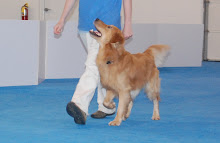Griffin was added to my home to be my competition (obedience and agility especially!) dog.... but also my demo dog and to go out and help me help other people learn about training and dogs. Both are very important, almost equally important and possibly a bit contradictory.
Other people cuing Griffin runs the risk of Griffin learning to generalize. He might responding to cues I would not normally want to be cues. He might start giving poor behaviors or responding incorrectly. And he may be reinforced for it. This could hurt his behaviors and hurt the concepts he understands.
At the same time... I do what I can to preserve our cues and behaviors.
- Performance and Casual cues: I don't give away my special, "sacred," unique competition cues. I show people things that are not as important.*
- Supervision: I can specify what things we will or will not reinforce, so the new trainers are doing things correctly.
- Consistency: I am careful that when - I- train, I do not accept poor responses. Dogs can and do learn that different people have different requirements. I want to be very clear with what I expect and always expect.
- Fluency: In some ways, his response to cues given by other people show that he has behaviors with a high level of fluency. He really gets it. The behavior is proficient. I can see what parts of the cue are relevant to the behavior and which are not.
- Discrimination: At the same time, there are some behaviors and situations where I do not want him to respond to cues given by other people (competition obedience). So, I don't give away these cues. We don't work on these behaviors in the other-people-handling environment.
I also recognize the benefits of this environment for Griffin. He is learning to be even better behaved around kids. He's learning to engage with people. I am recalling him back to me on a regular basis, meaning great recall training opportunities. I can see which behaviors are strong, and which behaviors are not strong.
Last week, at the 4H Teen Camp, Luna's job was to come out during lunch. She's too shy to steal a supervised sandwich, but she would go around to the kids to solicit food. They could ask for behaviors she knows well (Sit, Down, Spin, Wave). They would reinforcer her with a piece of food. The kids were fairly stationary and sitting to eat, meaning they were not as likely to startle her compared to the usual activities. By the last day, she was more enthusiastic, working harder, and less anxious compared to earlier in the week.
 |
| Tired Luna. |
There is the benefit for the people involved. Cueing and handling a skilled dog is a very different experience than working with a less experienced dog. It can help give a good picture of the final behavior, how discrete cues can be. How to shape behaviors and add cues. In some ways, there is less risk of "messing up" the dog than with a beginner dog.
The kids we played with on Monday, learned to quietly give a cue. They learned to reinforce the behavior. They learned to start out with the exercise as easy as possible. They learned to interact with dogs and had a good time with a dog. And all of that is -so- important. And in the long run, way more important than Griffin doing his beautiful competition behaviors. That is why I'm so happy to have other people handle and train and play with my dogs.




No comments:
Post a Comment